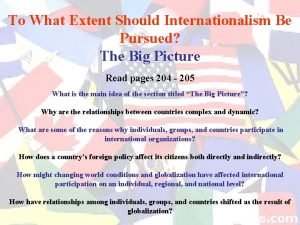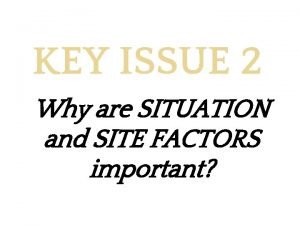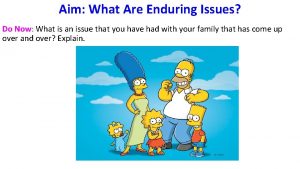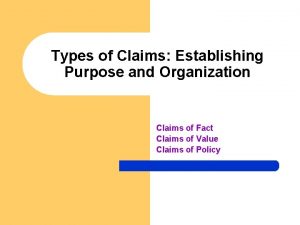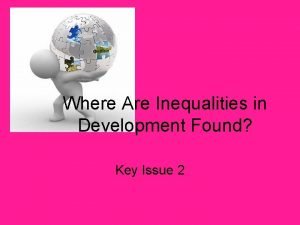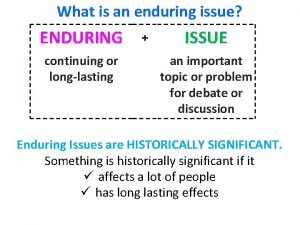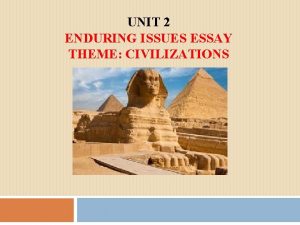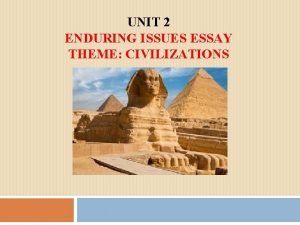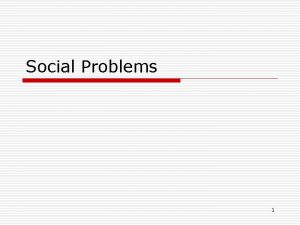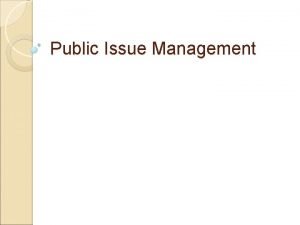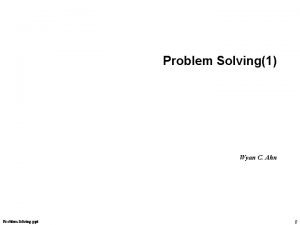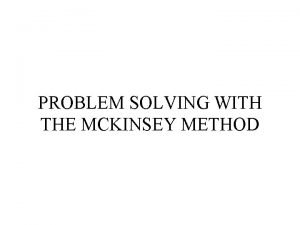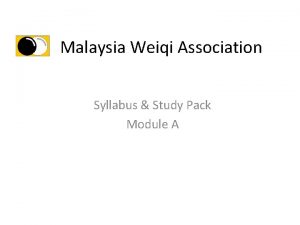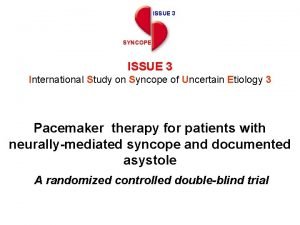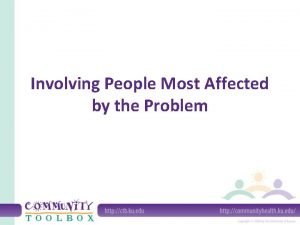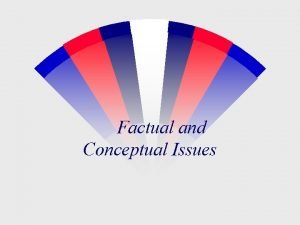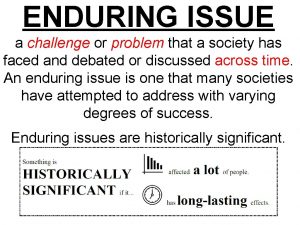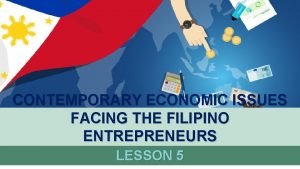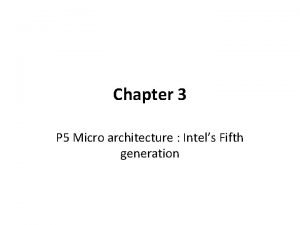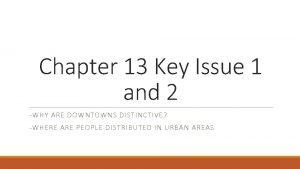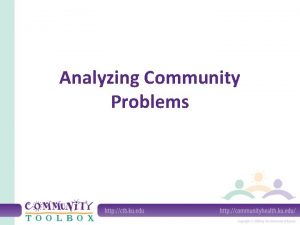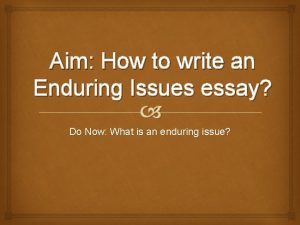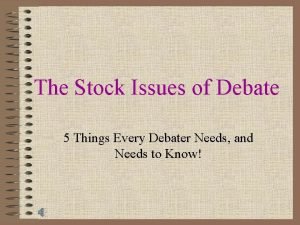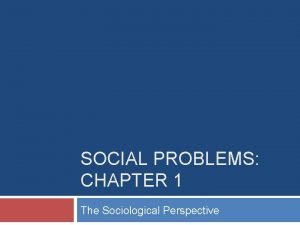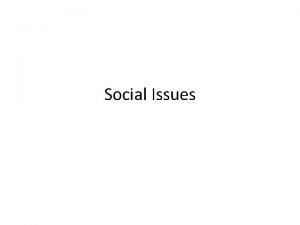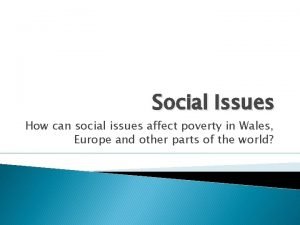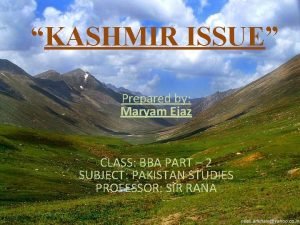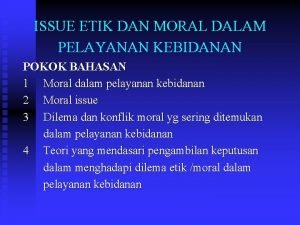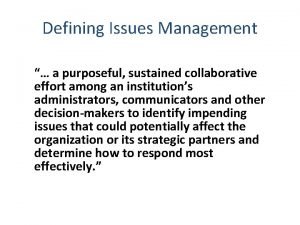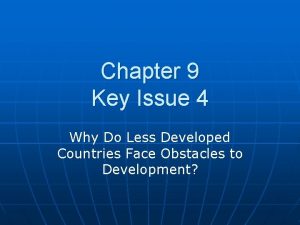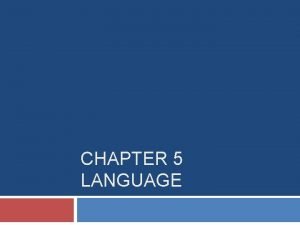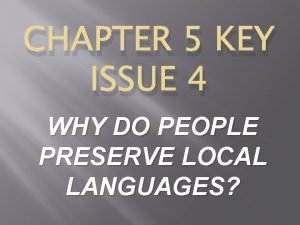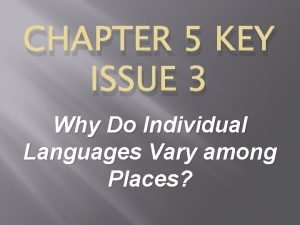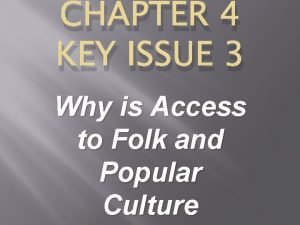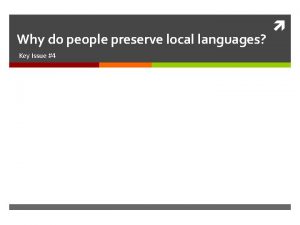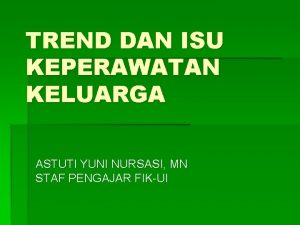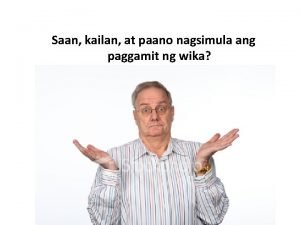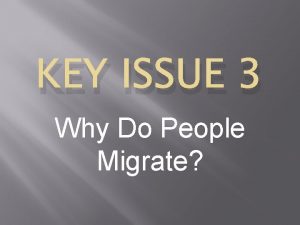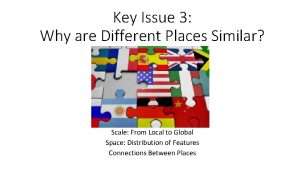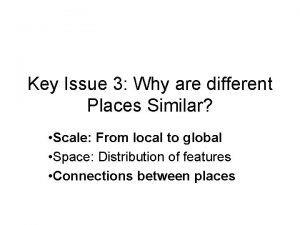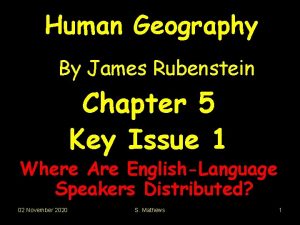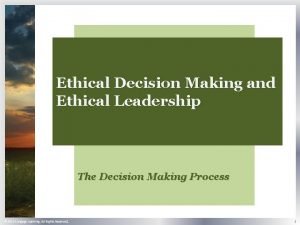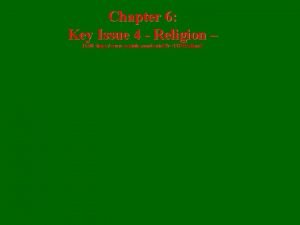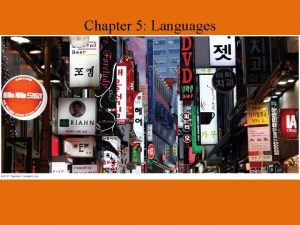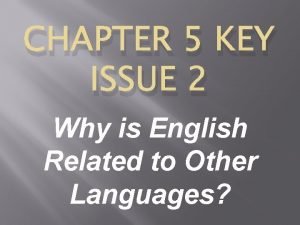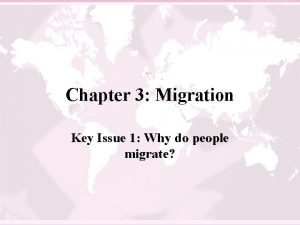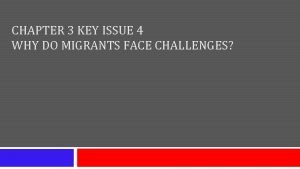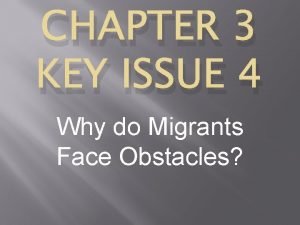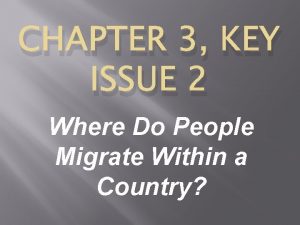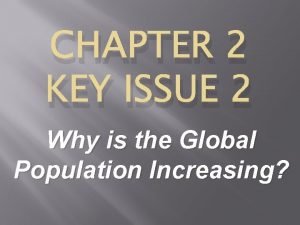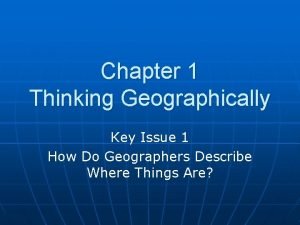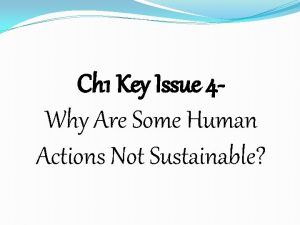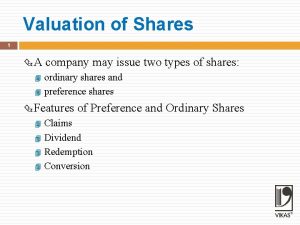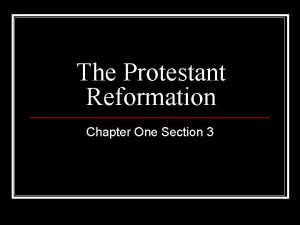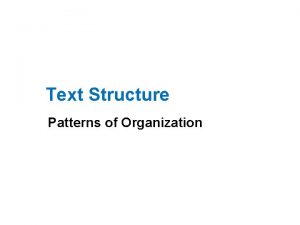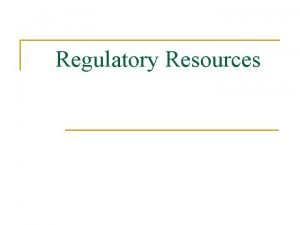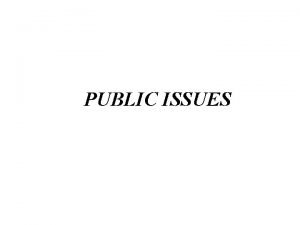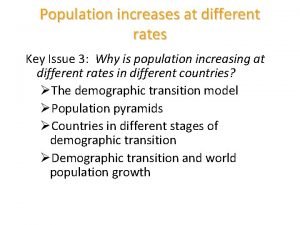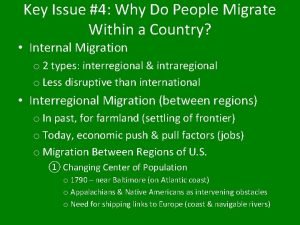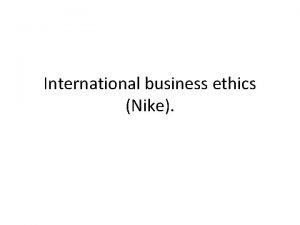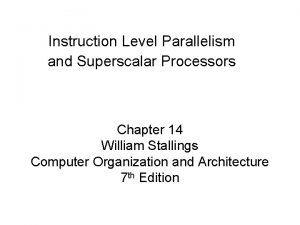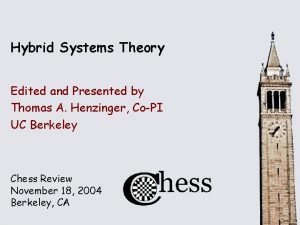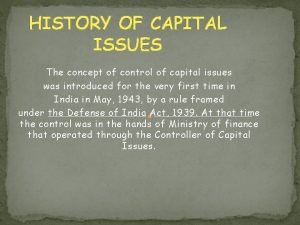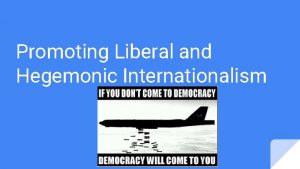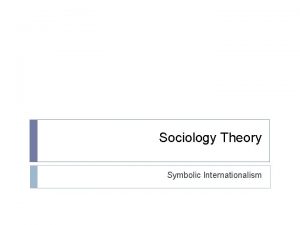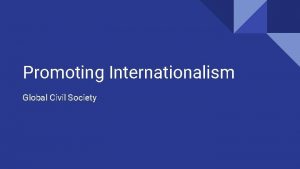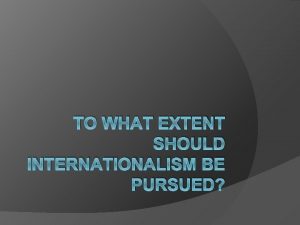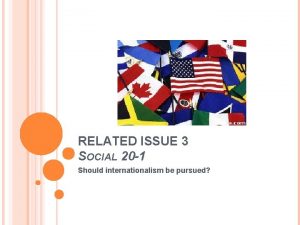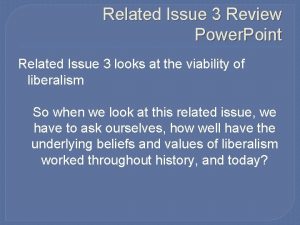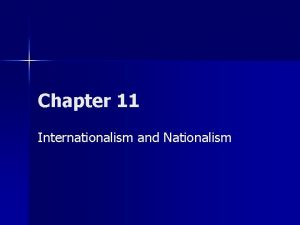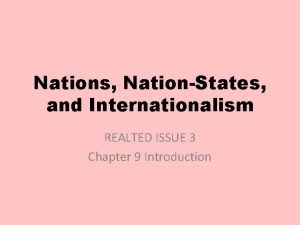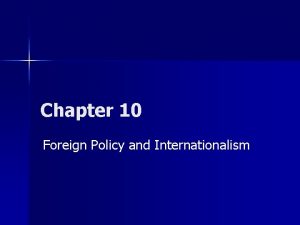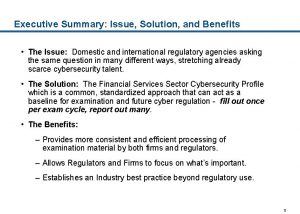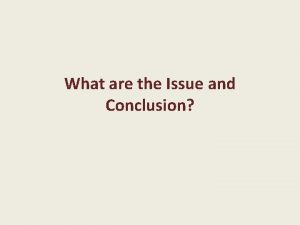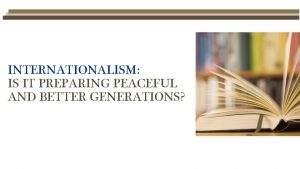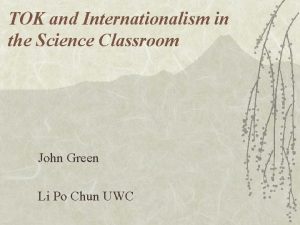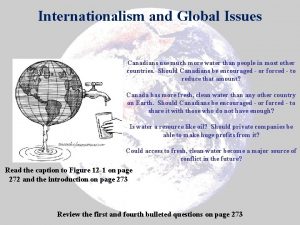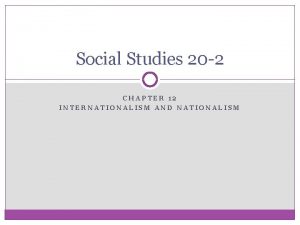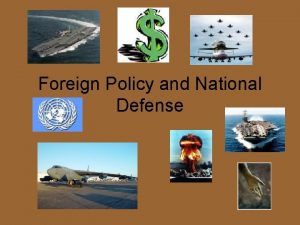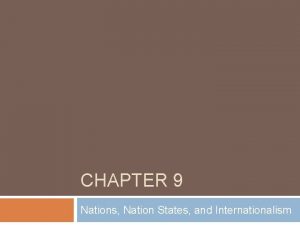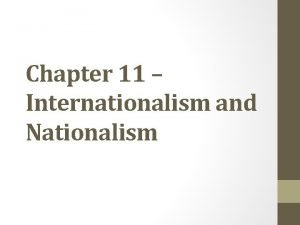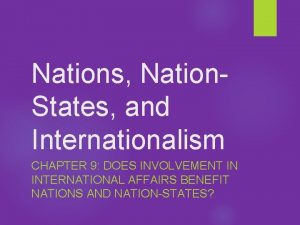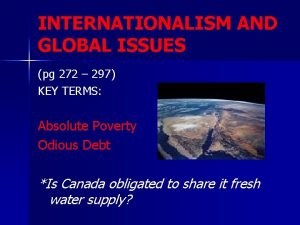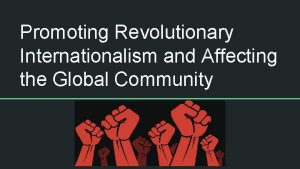RELATED ISSUE 3 INTERNATIONALISM Related Issue3 Internationalism and













































































![• The Hague (Dutch: Den Haag pronounced [dɛnˈɦaːx] ( listen); officially 's-Gravenhage pronounced • The Hague (Dutch: Den Haag pronounced [dɛnˈɦaːx] ( listen); officially 's-Gravenhage pronounced](https://slidetodoc.com/presentation_image_h2/b43a087037b7e538f586caaf6f568f76/image-78.jpg)


































- Slides: 112

RELATED ISSUE #3 INTERNATIONALISM

Related Issue#3 • Internationalism and Contemporary Global Affairs

The long term effects of World War II: • • • Set the geo-political groundwork for the Cold War Human rights movements around the world A deep distrust of hierarchy/inequality in the West … to this day we are extremely reluctant to criticize the cultural practices of any ethnic group for fear of becoming “Nazis” … but, what about “female circumcision? , ” so-called “honour killing? ” We must judge these cultural practices and reject them unequivocally!

Self-determination • After World War II, many of the peoples of the world asked for, and were granted, their own nations.

Self-Determination • In Canada, some Quebecois and some First Nations desire “Selfdetermination” and argue that they have a right to govern themselves. This becomes complicated in Quebec, where, First Nations do not want to separate from Canada along with Quebec if it left!

United Nations • an international organization whose stated aims are facilitating cooperation in international law, international security, economic development, social progress, human rights, and achievement of world peace. The UN was founded in 1945 after World War II to replace the League of Nations, to stop wars between countries, and to provide a platform for dialogue. It contains multiple subsidiary organizations to carry out its missions.





Collective Security • • • Nations agree that together they will protect the sovereignty of each – through military action if necessary … League of Nations (failed) United Nations (no nuclear holocaust, but not because of collective security)


Balance of Power • • The arrangement of nations/borders in a manner that prevents the dominance of one nation over the others … Congress of Vienna – sought to limit the future power of France Treaty of Versailles – attempted to limit the rebirth of a strong and aggressive Germany (by limiting army, air force, continental territories, colonies) Paris Peace Conferences and the Treaty of Versailles – sought to limit the power of Germany

Cold War • • • The Cold War, often dated from 1945– 1991, was a sustained state of political and military tension between powers in the Western world, dominated by the United States with NATO and other allies; versus powers in the Eastern world, dominated by the Soviet Union with its Warsaw Pact and other allies. This tension existed against the background of the atom bomb. Description of Enriched Uranium



Mutually Assured Destruction (MAD)

Blue – Capitalist/democracy Red – Communist / Dictatorship

James Bond and the Cold War • Bond villains have provided a reliable snapshot of the differing species of fear and paranoia thriving over the past five decades. Dr No (Joseph Wiseman), the megalomaniac who lent his name to the title of the first Bond movie, was intent on sabotaging a US missile launch – all things nuclear being much on the mind of a world in which cold war tensions were about to crystallise in the Cuban missile crisis. Missiles never really stopped being the default obsession of the Bond villain, cropping up again in films including Thunderball and The Spy Who Loved Me, while the über-villain Blofeld (Donald Pleasence) stokes cold war tensions by snatching US and Soviet spacecraft in You Only Live Twice. Clips

Looking back, it sometimes seems as if the threat of the cold war, the destruction of humanity, was exaggerated, however, there were a number of documented occasions where we came close …

The USSR • • The USSR was a dictatorship of the worst kind … it explicitly sought world-wide revolution. It’s aim was nothing less thant the destruction of liberal democracy … our way of life. The regime of the USSR opposed: • • Free thought Free speech Private property The promotion of merit and excellence

NATO • North Atlantic Treaty Organization, is an intergovernmental military alliance created on 4 April 1949. The organization constitutes a system of collective defence whereby its member states agree to mutual defense in response to an attack by any external party. NATO's headquarters are in Brussels, Belgium

Pop Culture • The Day After – at 55 minutes the bomb drops 99 red balloons • We didn’t start the fire … Billy Joel •

Canada • Canada was one of the original members of NATO

The Canadian Armed Forces • The Canadian Forces is the unified armed force of Canada, as constituted by the National Defence Act, which states: "The Canadian Forces are the armed forces of Her Majesty raised by Canada and consist of one Service called the Canadian Armed Forces. "



NORAD • North American Aerospace Defense Command is a joint organization of Canada and the United States that provides aerospace warning, air sovereignty, and defense for the two countries.

• Headquarters NORAD and the NORAD/USNORTHCOM command center are located at Peterson Air Force Base in El Paso County, near Colorado Springs, Colorado. The nearby Cheyenne Mountain nuclear bunker has the Alternate Command Center.





Warsaw Pact • The Warsaw Treaty Organization of Friendship, Cooperation, and Mutual Assistance (1955– 1991), more commonly referred to as the Warsaw Pact, was a mutual defense treaty between eight communist states of Eastern Europe in existence during the Cold War. The founding treaty was established under the initiative of the Soviet Union and signed on 14 May 1955, in Warsaw.

Peacekeeping • • Peacekeeping refers to activities that tend to create conditions that favor lasting peace. Most such international operations are established and implemented by the United Nations itself, with troops serving under UN operational control. In these cases, peacekeepers remain members of their respective armed forces, and do not constitute an independent "UN army", as the UN does not have such a force.



• In cases where direct UN involvement is not considered appropriate or feasible, the Council may consider authorizing regional organizations such as the North Atlantic Treaty Organization (NATO), the Economic Community of West African States, or other coalitions of willing countries to undertake peacekeeping or peace-enforcement tasks. [

Peacekeeping • • United Nations peacekeeping was initially developed during the Cold War as a means of resolving conflicts between states by deploying unarmed or lightly armed military personnel from a number of countries, under UN command, to areas where warring parties were in need of a neutral party to observe the peace process. 22 minute video - Peacekeeping in the Congo biggest mission ever

• Peacekeepers could be called in when the major international powers (the five permanent members of the Security Council) tasked the UN with bringing closure to conflicts threatening regional stability and international peace and security. These included a number of so-called "proxy wars" waged by client states of the superpowers. As of October 2011, there have been 66 UN peacekeeping operations since 1948, with sixteen operations ongoing.

Peacekeeping / humanitarianism– disguised imperialism?


Canadian Peacekeeping • Since 1956, more than 125, 000 Canadians have taken part in about 50, 000 peacekeeping missions.

UNESCO • • United Nations Educational, Scientific, and Cultural Organization Video – Highlights of UNESCO, 2012 4 minutes

Peacemaking • • • Peacemaking is practical conflict resolution focused upon establishing equitable power relationships that discourage future conflict It may include the use of military forces It usually includes the establishment of structures for future conflict resolution

Canada’s International Involvements • • • U. N. Nato – defense alliance, supranationalism NORAD – bilateral, defense alliance – Arctic Council Francophonie Commonwealth (all former British Colonies)

La Francophonie • - an international organization of countries and regions where French is the first ("mother") or customary language; and/or where a significant proportion of the population are francophones (French speakers); and/or where there is a notable affiliation with French culture.

The International Criminal Court • • • The tribunals set up after World War II, to deal with the war criminals responsible for the Holocaust, showed the world the need for a permanent international criminal court – but it took 50 years to figure out how to set it up and reach agreement about its powers! The ICC was set up by the UN in 1998 was not and is only for extreme situations where a nation does not or can not prosecute criminals itself. UN video – ICC 29 minutes

The Geneva Convention (s) • • • The Geneva Conventions comprise four treaties - establish the standards of international law for the humanitarian treatment of war. The singular term Geneva Convention denotes the agreements of 1949 The articles of the Fourth Geneva Convention (1949) extensively defined the basic, wartime rights of prisoners (civil and military); established protections for the wounded; and established protections for the civilians in and around a war zone. The treaties of 1949 were ratified, in whole or with reservations, by 195 countries. the Geneva Convention also defines the rights and protections afforded to non-combatants, yet, because the Geneva Conventions are about people in war, the articles do

INTERNATIONAL CRIMINAL COURT Case Study: (the former) Yugoslavia BBC Documentary: The Death of Yugoslavia The Roots of War – Yugoslavia (one hour)

Yugoslavia: • Yugoslavia was a country in the western part of the Balkans during most of the 20 th century.

The Kingdom of Yugoslavia, which before 3 October 1929 was known as the Kingdom of Serbs, Croats and Slovenes was established on 1 December 1918 by the union of the State of Slovenes, Croats and Serbs and the Kingdom of Serbia

World War II • The Kingdom of Yugoslavia was invaded by the Axis powers in 1941, and because of the events that followed, was officially abolished in 1943 and 1945.

And then comes Communism… • The Democratic Federal Yugoslavia was proclaimed in 1943 by the Partisans resistance movement during World War II.

• It was renamed to the Federal People's Republic of Yugoslavia in 1946, when a communist government was established.

• In 1963, it was renamed again to the Socialist Federal Republic of Yugoslavia.

• There were constituent six Socialist Republics and two Socialist Autonomous Provinces that made up the country were: Bosnia and Herzegovina, Croatia, Macedonia, Montenegro, Serbia (including two provinces of Vojvodina and Kosovo).


• In 1987, Serbian communist official Slobodan Milošević was sent to bring calm to an ethnically-driven protest by Serbs against the Albanian administration of SAP Kosovo.


• "At home and abroad, Serbia's enemies are massing against us. We say to them 'We are not afraid'. 'We will not flinch from battle'. " • - Slobodan Milošević, 19 November 1988. [14]

• "We Serbs will act in the interest of Serbia whether we do it in compliance with the constitution or not, whether we do it in compliance in the law or not, whether we do it in compliance with party statutes or not. " Slobodan Milošević[15]

Starting in 1991, Yugoslavia disintegrated in the Yugoslav Wars.

• The breakup of Yugoslavia (the Socialist Federal Republic of Yugoslavia, also known as "SFR Yugoslavia" or "SFRY") occurred as a result of a series of political upheavals and conflicts during the early 1990 s.

• In 2008 Kosovo unilaterally declared independence from Serbia.

The government building in the centre of Sarajevo burns after being hit by tank fire during the siege in 1992

• The following years saw various battles as the Yugoslavian successor states fought for independence, or, out of long standing historical bitterness.

• The war in the western parts of former Yugoslavia ended in 1995 with US-sponsored peace talks in Dayton, Ohio, which resulted in the Dayton Agreement. • The Kosovo war started in 1996 and ended with the 1999 NATO bombing of Yugoslavia; NATO had intervened to prevent widespread human rights abuses by Serb forces. Slobodan Milošević was overthrown in 2000.

• Slobodan Milošević was a Serbian and Yugoslav politician who was the President of Serbia from 1989 to 1997 and President of the Federal Republic of Yugoslavia from 1997 to 2000.

• Amongst his supporters, Milošević was known by the nickname of "Slobo". He also led the Socialist Party of Serbia from its foundation in 1990. His presidency was marked by the breakup of Yugoslavia and the subsequent Yugoslav Wars

• Milosevic is associated with crimes against humanity against those he saw as a threat to the best interests of Serbia.

• The term Bosnian Genocide refers to either the massacre committed by Bosnian Serb forces in Srebrenica in 1995 or the ethnic cleansing campaign that took place throughout areas controlled by the Army of the Republika Srpska during the 1992– 1995 Bosnian War. [4]

• The events in Srebrenica in 1995 included the killing of more than 8, 000 Bosnian Muslim men and boys, as well as the mass expulsion of another 25, 000– 30, 000 Bosnian Muslim civilians, in and around the town of Srebrenica in Bosnia and Herzegovina, committed by units of the Army of the Republika Srpska (VRS) under the command of General Ratko Mladić.

• The ethnic cleansing campaign that took place throughout areas controlled by the VRS targeted Bosnian Muslims and Bosnian Croats.

• The ethnic cleansing campaign included unlawful confinement, murder, rape, sexual assault, torture, beating, robbery and inhumane treatment of civilians; the targeting of political leaders, intellectuals and professionals; the unlawful deportation and transfer of civilians; the unlawful shelling of civilians; the unlawful appropriation and plunder of real and personal property; the destruction of homes and businesses; and the destruction of places of worship. [7]

• . In the midst of the 1999 NATO bombing of Yugoslavia, Milošević was charged with war crimes and crimes against humanity in connection with the wars in Bosnia, Croatia and Kosovo by the International Criminal Tribunal for the former Yugoslavia (ICTY).

• Milosevic was sent to The Hague to stand trial for War Crimes.
![The Hague Dutch Den Haag pronounced dɛnˈɦaːx listen officially sGravenhage pronounced • The Hague (Dutch: Den Haag pronounced [dɛnˈɦaːx] ( listen); officially 's-Gravenhage pronounced](https://slidetodoc.com/presentation_image_h2/b43a087037b7e538f586caaf6f568f76/image-78.jpg)
• The Hague (Dutch: Den Haag pronounced [dɛnˈɦaːx] ( listen); officially 's-Gravenhage pronounced [ˈsxraːvə(n)ˌɦaːɣə] ( listen)) is the capital city of the province of South Holland in the Netherlands.

• • Milošević conducted his own defense in the five -year long trial, which ended without a verdict when he died on 11 March 2006 in his prison cell in The Hague. Milošević, who suffered from heart ailments and hypertension, died of a heart attack. The Tribunal denies any responsibility for Milošević's death, and ruled that he refused to take prescribed medicines and medicated himself instead. Slobodan – Initial Appearance

Rwanda • • Two ethnic groups: Hutus and Tutsis Former Belgian colony – gained independence in 1962 A power struggle erupted between the groups – rooted in the days of Belgian rule Hutu ultranationalists used radio to spread hate propaganda against the Tutsis - ; which led to a killing spree against the Tutsis – 800 000 died

• • • Interview with Romeo Dallaire The reason why the UN did not save these people is because it was not supposed to intervene in a country’s domestic affairs … This was a genocide.

Canadian Involvement in UN Missions: • 1947 -48: UNTCOK—United Nations Temporary Commission on Korea. Canada sends a contingent to Korea to supervise elections and withdrawal of USSR and US from Korea.

Canada’s Role • 1949 -ongoing: UNMOGIP—United Nations Military Observer Group in India and Pakistan (Kashmir). Canada contributes a contingent to the mission in Pakistan to supervise ceasefire between India and Pakistan.

• 1948 -ongoing: UNTSO—United Nations Truce Supervision Organization. Canada contributes a contingent to the 1 st peacekeeping type operation operated by UN observer groups in Palestine. Today, military observer groups (including 7 Canadian military observers) continue to supervise and monitor the ceasefire.

• • 1950 -53: UNSK—United Nations Service in Korea. Canada sends the 3 rd largest contingent to UN mission in Korea. MASH Episode

• 1956: Canada’s Minister for External Affairs, Lester B. Pearson proposes to the UN General Assembly to send a multinational contingent to the Middle East, in response to the Suez Crisis. This culminated in the first designated UN “peacekeeping” mission—UNEF I.

• 1957: Lester B. Pearson is awarded the Nobel Peace Prize for his remarkable diplomatic achievements and his innovative thinking in resolving the Suez Crisis through the establishment of a UN Emergency Force.

• 1964 -ongoing: UNIFICYP—United Nations Forces in Cyprus. UNIFICYP is Canada’s longest UN peacekeeping mission. The purpose was to maintain balance between the Greek and Turkish Cypriots in their newly created island.

• 1974 -ongoing: UNDOF—United Nations Disengagement Observer Force. Canada sends a contingent to the buffer zone between Israel and Syria, and provides communication, logistics and technical support for the UN force. • • 1978 -ongoing: UNIFIL—United Nations Force in Lebanon. Canada sends contingent to Lebanon to support security to the government.

• 1991 -95: ONUSAL—United Nations Observer Mission in El Salvador. Canada sends contingent to observer mission to monitor ceasefire following El Salvador’s 12 year civil war

• 1991 -99: UNSCOM—United Nations Special Commission on Iraq. Canada sends contingent to supervise commission in Iraq.

• 1992 -95: UNPROFOR—United Nations Protection Force. Canada sends a contingent to Croatia to monitor demilitarization of designated areas. The mandate was later extended to Macedonia to monitor border areas.

• 1993 -96: UNAMIR—United Nations Assistance Mission for Rwanda. Canada sends contingent to the mission in Rwanda. Canadian Lt. -Gen. Roméo Dallaire led this mission to supervise the warring Tutsi and Hutu population. This mission meets significant hurdles as UN troops witness the slaughter of nearly 800, 000 Rwandans in what will later be identified as genocide. Despite specific plans by Lt. General Dallaire to retaliate upon growing violence, the UN does not agree. This mission is viewed as a significant failure, resulting in not only the loss of hundreds of thousand Rwandans but also a significant loss of UN lives.

• 1995 -2002: UNPREDEP—United Nations Preventive Deployment Force to the Balkans. • • 1995 -2002: UNMIBH—United Nations Mission in Bosnia and Herzegovina. Canada contributes 30 civilian police.

• • 2006: Canada ranks 55 th (out of 108) as a UN peacekeeping nation based on its commitment of military and police personnel. Over the years, Canada has sent over 120, 000 troops as part of UN peacekeeping missions, and it has the 2 nd highest peacekeeping fatality with 114 fatalities. Statistics provided on page 238 of the text

Humanitarianism • • Foreign Aid – medical supplies, food, clothing, building supplies, expertise 1968 – Lester B. Pearson … challenges the world’s richest countries to spend 0. 7 % of their GNI on foreign aid 2006 – we gave. 333% (Can be provided by nations, (CIDA), the U. N. , or NGOS (Doctors Without Borders)

The Price of Humanitarianism? • • Giving aid isn’t as simple as it sounds … it can be dangerous, and the results can be complicated … it may enshrine the “status quo” or it may fall into the hands of warlords/criminals. Consider the events surrounding “Black Hawk Down”

Black Hawk Down

Criticism of Foreign Aid • • • Competing motives – economic advantage, prop up a weak government, help a wartime ally Tied aid – strings are attached … for instance the nation that receives aid must buy 90% of their food from Canada Aid can be inappropriate to culture Do damage –(infant’s milk) Bureaucracy

• • • Black market Corruption Brain drain … the best and the brightest of the nation that receives help gravitate to working in aid agencies or the developed world

Bilateralism • When two countries cooperate to reach the same goal

Multilateralism • When more than two countries cooperate/agree to work toward the same goal

Supranationalism • • • Nations agreeing to go along with the decisions made by an international organization NAFTA – Canada, the US, and Mexico, have agreed to cooperate in terms of trade, and to obey the rules that they negotiated together govern their trade relationships Other examples: the EU

EU • The EU has developed a single market through a standardized system of laws that apply in all member states. Within the Schengen Area (which includes 22 EU and 4 non-EU states) passport controls have been abolished. EU policies aim to ensure the free movement of people, goods, services, and capital, enact legislation in justice and home affairs, and maintain common policies on trade, agriculture, fisheries and regional development.


• A monetary union, the eurozone, was established in 1999 and is composed of 17 member states. Through the Common Foreign and Security Policy the EU has developed a role in external relations and defence. Permanent diplomatic missions have been established around the world. The EU is represented at the United Nations, the WTO, the G 8 and the G-20.

WHO • • The World Health Organization Formed by the United Nations in 1948 to tackle global health issues: • • Education about health – birth control, pre and neo natal care Clean water Nutrition Contagious diseases


The Arctic Council • • Nations with territory in the arctic have created this international organization to resolve common issues Canada, Finland, Norway, Russia, Sweden, the US, Denmark (which includes Greenland)


Humanitarianism • The desire to help others - regardless of their national/ethnic origin • • • Assisting victims of natural disasters – weather, war, etc. Assisting those in need in our own nation or community Usually concerning the satisfaction of basic needs – food, shelter, clothing, etc.

Are there negative long term effects?
 Should internationalism be pursued
Should internationalism be pursued 2 types of fitness
2 types of fitness What is skill-related fitness? *
What is skill-related fitness? * It is a real issue with genuine controversy and uncertainty
It is a real issue with genuine controversy and uncertainty Why are situation and site factors important
Why are situation and site factors important Innovation enduring issue
Innovation enduring issue Chapter 2 population and health key issue 3
Chapter 2 population and health key issue 3 What is the example of claim of value
What is the example of claim of value Key issue 2 where are inequalities in development found
Key issue 2 where are inequalities in development found What is an enduring issue
What is an enduring issue Issue preclusion
Issue preclusion Whats a enduring issue
Whats a enduring issue Enduring issue introduction example
Enduring issue introduction example Trend dan issue keperawatan gerontik
Trend dan issue keperawatan gerontik Trend dan isu komunikasi dalam pelayanan kesehatan
Trend dan isu komunikasi dalam pelayanan kesehatan Warning order format
Warning order format Whats an enduring issue
Whats an enduring issue Sociological problem definition
Sociological problem definition Trens pelayanan mental psikiatri pada era global adalah
Trens pelayanan mental psikiatri pada era global adalah Issue offer
Issue offer Inguinal hernia are a female reproductive health issue
Inguinal hernia are a female reproductive health issue Activities involved in public issue management
Activities involved in public issue management Problem solution tree
Problem solution tree Problem
Problem Issue of noise pollution
Issue of noise pollution Pohon masalah
Pohon masalah Example of an issue statement
Example of an issue statement New issue market meaning
New issue market meaning Malaysia weiqi association
Malaysia weiqi association Key issue 1: why do services cluster downtown?
Key issue 1: why do services cluster downtown? Issue 3 trial
Issue 3 trial Most affected people and areas
Most affected people and areas Journal entry for issue of bonus shares
Journal entry for issue of bonus shares Geography grade 12 / rural settlements
Geography grade 12 / rural settlements Conceptual issues in ethics
Conceptual issues in ethics Expressive techniques in research
Expressive techniques in research Enduring issue meaning
Enduring issue meaning Ewaybill2.nic.in says invalid login credentials
Ewaybill2.nic.in says invalid login credentials Issues facing the filipino entrepreneur
Issues facing the filipino entrepreneur Explain an instruction issue algorithm of pentium processor
Explain an instruction issue algorithm of pentium processor Chapter 13 key issue 4
Chapter 13 key issue 4 Why are downtowns distinctive
Why are downtowns distinctive Key issue 1 where are services distributed
Key issue 1 where are services distributed Chapter 12 key issue 1
Chapter 12 key issue 1 Chapter 11 key issue 4
Chapter 11 key issue 4 Audit right issue
Audit right issue Analyzing the issue
Analyzing the issue Problems in communities
Problems in communities Enduring issues essay topics
Enduring issues essay topics Key issue 1 where did agriculture originate
Key issue 1 where did agriculture originate Enduring issues essay regents
Enduring issues essay regents An issue
An issue Is global warming an enduring issue
Is global warming an enduring issue Trend dan issue keperawatan kritis
Trend dan issue keperawatan kritis Inherency debate definition
Inherency debate definition New face of america
New face of america What is sociological perspective
What is sociological perspective Social issue problem
Social issue problem Social issues examples
Social issues examples Conclusion of jammu and kashmir
Conclusion of jammu and kashmir Accauntability
Accauntability Hera queen of the gods
Hera queen of the gods Define issue management
Define issue management Chapter 9 key issue 4
Chapter 9 key issue 4 Layout
Layout Chapter 5 key issue 1
Chapter 5 key issue 1 Chapter 5 key issue 4
Chapter 5 key issue 4 Key issue 3 why do individual languages vary among places
Key issue 3 why do individual languages vary among places Chapter 4 key issue 3
Chapter 4 key issue 3 Chapter 13 key issue 4
Chapter 13 key issue 4 Key issue 2 where are consumer services distributed
Key issue 2 where are consumer services distributed Languages
Languages Travis iceberg model of wellness
Travis iceberg model of wellness Trend isu keperawatan keluarga
Trend isu keperawatan keluarga Kailan nagsimula ang wika
Kailan nagsimula ang wika Process choice is driven
Process choice is driven Key issue 3 why do people migrate
Key issue 3 why do people migrate How and why are places similar and different
How and why are places similar and different Why are places similar
Why are places similar Received pronunciation definition ap human geography
Received pronunciation definition ap human geography Ethical habits
Ethical habits Carlo_nnn issue
Carlo_nnn issue Chapter 6 key issue 4
Chapter 6 key issue 4 Key issue 1 where are languages distributed
Key issue 1 where are languages distributed Chapter 5 key issue 2
Chapter 5 key issue 2 The perceived relevance or importance of an ethical issue
The perceived relevance or importance of an ethical issue Chapter 4 key issue 2
Chapter 4 key issue 2 Key issue 3: why do people migrate?
Key issue 3: why do people migrate? Chapter 3 key issue 4
Chapter 3 key issue 4 Key issue 4 why do migrants face obstacles
Key issue 4 why do migrants face obstacles Key issue 2: where do people migrate within a country?
Key issue 2: where do people migrate within a country? Chapter 2 key issue 2
Chapter 2 key issue 2 Thinking geographically key issue 1
Thinking geographically key issue 1 In order issue in order completion example
In order issue in order completion example Key issue 4 why are some actions not sustainable
Key issue 4 why are some actions not sustainable Jami lost her debit card
Jami lost her debit card Valuation of shares
Valuation of shares Ices-001 issue 5
Ices-001 issue 5 The renaissance and reformation section 3 quiz answer key
The renaissance and reformation section 3 quiz answer key Enumeration signal words
Enumeration signal words Nafsa issue net
Nafsa issue net An offer document in case of a public issue is
An offer document in case of a public issue is Key issue 3 why does population growth vary among regions
Key issue 3 why does population growth vary among regions Issue profesional
Issue profesional Ethical issue intensity
Ethical issue intensity Key issue 4
Key issue 4 Issue month
Issue month Nike ethical issues
Nike ethical issues Definition of single issue groups
Definition of single issue groups In order issue in order completion example
In order issue in order completion example Computationality
Computationality Hkdse certificate issue date
Hkdse certificate issue date Control of capital issue
Control of capital issue
